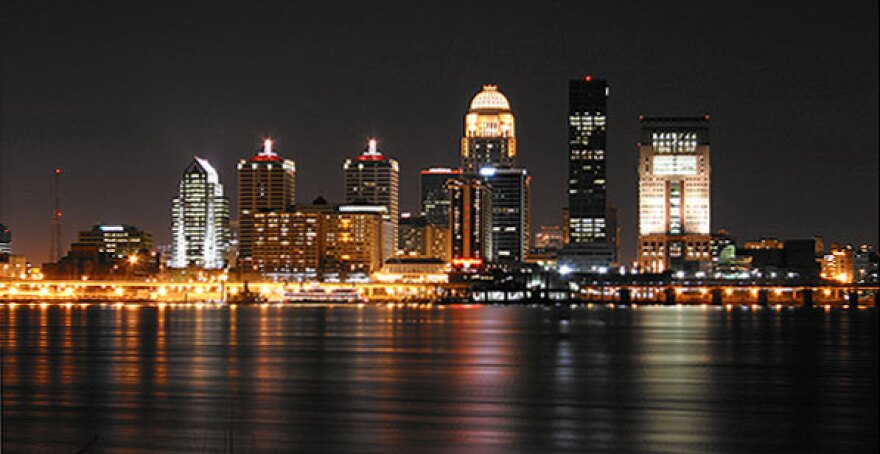Louisville’s new downtown restaurant Sidebar is packed with young professionals—new transplants—from all over the country. They're attending the monthly meet-up group New2Lou, which aims to welcome the recently-arrived to the city.
When I ask them why they came to Louisville I get similar answers: Humana, Ford Motor Company, the University of Louisville.Work.It’s why many people come to Louisville and it’s sometimes why people leave—for better opportunities or more money.For Louisville to grow, it'll need more of those opportunities—and more people capable of taking them on, whether they're homegrown or new to the city. Fostering an environment geared toward innovation is a key to making that happen, city officials say.Area colleges and universities are cranking out more degrees than ever before and Louisville now has a record number of residents that have earned an associate’s degree or higher.( See the city's recent 55,000 Degrees education initiative progress report)Those are positive trends. But, as pointed out in the 55,000 Degrees report, Louisville struggles to keep many of those homegrown degree earners around, and the city has issues attracting new talent too. As such, many experts and some city officials say to increase the number of residents with degrees (the goal is to have half the working-age population with an associate's degree or higher by 2020) Louisville will have to balance old ways and new ideas.It’ll need to attract more people like New2Lou founder Stacy Servo.“It was very random how I moved to Louisville. I actually didn’t even know where Kentucky was on a map,” she says.Before Louisville, Servo lived in Seattle for six years. But she says she wanted to move to a city with "potential" and one that had a decent cost of living. She considered Austin, Portland, Denver, but then settled on the Derby City.“I’ve pretty much moved every two years to a new city once I graduated from college, and every six months to a year apartments. I’m a transient person by nature," she says.Servo is like many others.About 40 percent of U.S. households change addresses every five years and around one-third of Americans reside in a state other than the one they were born in.Enrico Moretti is a University of California Berkeley economics professor who has studied these numbers in his book, The New Geography of Jobs. The educate people are the most mobile, he says.“The difference, it’s very large, and it accounts for the fact that highly educated workers on average tend to be in better labor markets," he says.Moretti says this means there’s plenty of talent willing to move to a new city. But he says only a small handful of cities are doing a good job proving that they’re the place to be. Those cities he calls “innovation” or “brain hubs," such as New York, Los Angeles, and Boston.Further, there’s no prescription for becoming an innovation hub, he says, and they always seem to be created through random, serendipitous events and not public policy.But part of that is attracting young talent, whose values have changed and have had to adapt to new technology and ways of living and thinking that their parents never dealt with, says Ted Smith, Louisville’s director of economic growth and innovation.“You look at all those scripts that were in that generation, very few of them actually apply today, I believe," he says. Louisville needs more companies like Humana that are headquartered in the city and will bring the higher-paying jobs, Smith says. At the same time the city can't neglect its manufacturing industry, which has been considered one of the most valuable job creating assets.But while Louisville considers ways to grow its economy it'll need to also address its low wage growth, as outlined in a 2012 Greater Louisville Project report. Smith says to attract the business that will have the high-paying jobs Louisville lacks, the city should consider innovating from the ground up rather than wining and dining large corporations in hopes that they move here.To do this, Louisville will have to do more than just show up on lists like GQ’smanliest town in America, or Lonely Planet’s Top Travel Destination. It will need to prove to young professionals that Louisville is place to innovate and grow ideas.“The only known recipe for this is density,” says Smith.Density, like inNew York and Boston where the odds of bumping into new people that could inspire you are significantly higher.“Do that test for Indianapolis, do that test for Cincinnati, do that test for Louisville, do that test for St. Louis. The odds that you will meet somebody new, interesting, might change your whole trajectory are significantly lower in these cities,” Smith says.But, this idea of density can be manufactured by encouraging people to get out and about, he says. But this will include developing areas where this density can occur. Think Nulu, which didn’t exist just a few years ago but has now become a hub for art, food and Louisvillians walking around and seeing new ideas.“We need to have those collisions happening all the time," Smith says.Like at the monthly New2Lou event, where you’re running into people from companies, organizations and others who aren’t new to Louisville at all, but who just come to meet new people.For Stacey Servo, it’s more important that Louisville offers her the chance to create change that’s tangible.“You can actually have an impact in the city. You can be involved in the community as little or as much as you want to be. It’s a little overwhelming in larger cities," she says.


